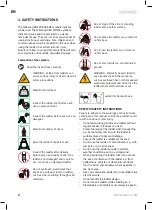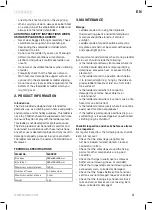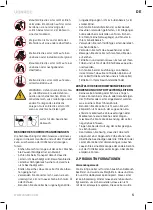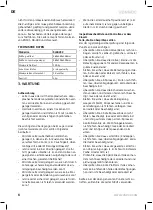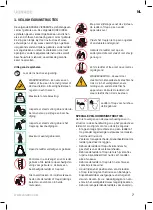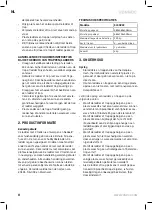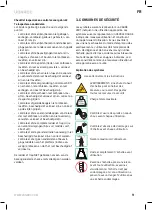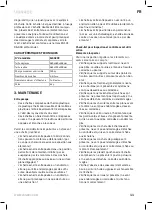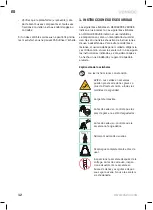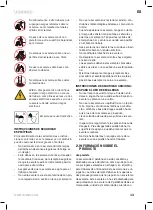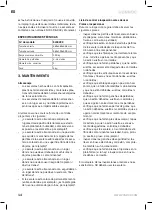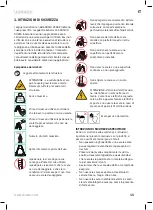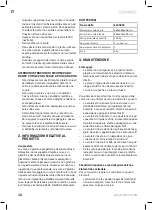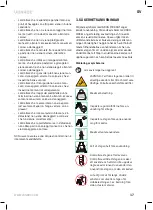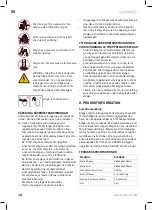
EN
3
WWW.VONROC.COM
oned on their feet and not on the step/rung.
- When carrying out work, always keep both feet
on a step/rung of the stepladder or ladder and
always face the ladder/stepladder.
ADDITIONAL SAFETY INSTRUCTIONS WHEN
USING STEPLADDERS/LADDERS
- Never wear baggy clothing or jewellery. These
could become caught when ascending or
descending the stepladder or ladder which
could lead to a fall.
- Do not use the ladder if you are not fit enough.
Certain medical conditions or medication,
alcohol or drug abuse could make ladder use
unsafe.
- Do not wear unsuitable footwear when climbing
a ladder.
- Frequently check that the feet are not worn.
Worn feet may damage the support surface, or
can result in the stepladder or ladder slipping.
- Do not leave any tools or other equipment at the
bottom of the stepladder or ladder which you
might trip over.
2. PRODUCT INFORMATION
Intended use
The 2 step ladder is designed and intended for
domestic use, as a climbing aid in home and garden
environments and for hobby purposes. This ladder is
not a toy. Children should be supervised at all times
to ensure they do not play with the ladder system.
This ladder is not developed for professional use.
The 2 step ladder must be handled, cared for and
maintained in accordance with these instructions.
Any other use is deemed improper and may result in
damage to property, personal injury or even death.
The ladder complies to the norms of EN 14183 and
Warenwet.
TECHNICAL SPECIFICATIONS
Model No.
SL502XX
Size open
385x485x438mm
Size folded
385x195x500mm
Maximum permissible load
150 kg
Number of treads
2- double sided
Maximum number of users
1 user
Weight
2 kg
3. MAINTENANCE
Storage
- Ladders made of or using thermoplastic,
thermosetting plastic and reinforced plastic
materials should be stored out of direct
sunlight.
- Ladders made of wood should be stored in a
dry place and shall not be coated with opaque
and vapourtight paints.
The important considerations when storing a ladder
(not in use) should include the following:
- Is the ladder stored away from areas where its
condition could deteriorate more rapidly (e.g.
dampness, excessive heat, or exposed to the
elements)?
- Is the ladder stored in a position which helps
it to remain straight (e.g. hung by the stiles on
proper ladder brackets or laid on a flat clutter
free surface)?
- Is the ladder stored where it cannot be
damaged by vehicles, heavy objects, or
contaminants?
- Is the ladder stored where it cannot cause a trip
hazard or an obstruction?
- Is the ladder stored securely where it cannot be
easily used for criminal purposes?
- If the ladder is permanently positioned (e.g. on
scaffolding), is it secured against unauthorized
climbing (e.g. by children)?
Checklist inspection and checks before use Items
to be inspected
For regular inspection, the following items shall be
taken into account:
- Check that the stiles/legs (uprights) are
not bent, bowed, twisted, dented, cracked,
corroded or rotten;
- Check that the stiles/legs around the fixing
points for other components are in good
condition;
- Check that fixings (usually rivets, screws or
bolts) are not missing, loose, or corroded;
- Check that rungs/steps are not missing, loose,
excessively worn, corroded or damaged;
- Check that the hinges between front and rear
sections are not damaged, loose or corroded;
- Check that the locking stays horizontal, back
rails and corner braces are not missing, bent,
loose, corroded or damaged;


